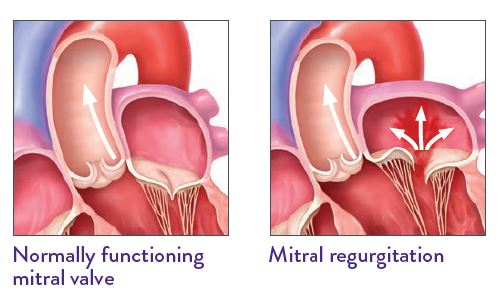Definition of Mitral Regurgitation - primary and secondary
There are two types of mitral regurgitation (MR)
One type of mitral regurgitation is called
primary MR (also called degenerative or organic). It is caused by an abnormality in the mitral valve itself. Primary MR can be related to age, a valve abnormality present from birth, heart disease, coronary artery disease, or a history of rheumatic fever. The other type is called
secondary (or functional) MR. It is caused by heart disease that leads to an enlarged left ventricle. Patients with MR can be good candidates for the MitraClip procedure.
Symptoms of mitral regurgitation:
- Shortness of breath
- Fatigue
- Coughing, dry hacking cough
- Excessive urination
- Lightheadedness, fainting
- Swollen feet or ankles
- Excessive urination
- Inability to exercise
- Decrease in appetite

